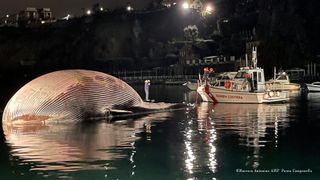Dead whale in the Mediterranean probably 'one of the largest' ever found
Finback whales are the second-largest animal species on Earth. They are considered endangered.

The carcass of an enormous finback whale (Balaenoptera physalus) was discovered near the Italian port of Sorrento earlier this week, the Italian Coast Guard said in a Facebook post.
Officials discovered the carcass on Sunday (Jan. 17), before towing it to the nearby port at Naples. The whale measured about 65 feet (20 meters) long and likely weighed more than 77 tons (70 metric tons) — likely making the corpse "one of the largest" ever found in the Mediterranean Sea, according to the agency.
Coast Guard divers first discovered the whale after a young calf swam into the Sorrento harbor in a state of distress, according to news reports. The calf reportedly rammed its head into the harbor walls several times before retreating back underwater; when divers followed it, they discovered the fin whale's corpse.
Related: Images of whales: giants of the deep
The calf is presumed to be the dead whale's offspring, and the Coast Guard is monitoring for signs of the young whale's return. Meanwhile, marine biologists in Naples are working to ascertain what killed the whale.
Finback whales (also known as fin whales) are the second-largest animals on Earth, after the iconic blue whale. Finbacks can grow to be 85 feet (25 m) long and weigh up to 80 tons (72 metric tons), according to the National Oceanic and Atmospheric Administration (NOAA). They are considered endangered after commercial whaling decimated the global finback population over the last century.
Today, commercial whaling is illegal throughout most of the world, and boat strikes pose the biggest threat to finbacks, according to NOAA.
Sign up for the Live Science daily newsletter now
Get the world’s most fascinating discoveries delivered straight to your inbox.
Originally published on Live Science.

Brandon is the space/physics editor at Live Science. His writing has appeared in The Washington Post, Reader's Digest, CBS.com, the Richard Dawkins Foundation website and other outlets. He holds a bachelor's degree in creative writing from the University of Arizona, with minors in journalism and media arts. He enjoys writing most about space, geoscience and the mysteries of the universe.
